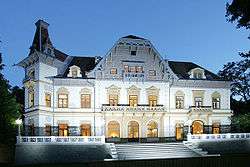Political Academy of the Austrian People's Party
The Political Academy of the Austrian People's Party is the educational institution of the Austrian People's Party (Österreichische Volkspartei).

The “Political Academy” supports civic, political and cultural education by means of seminars, training courses, lectures, publications, applied research, etc. The Political Academy is located in the "Springer Schlössl" (Springer Castle) in Vienna.
It is a member of the Centre for European Studies, the official foundation/think tank of the European People's Party.
Development
On 9 July 1972, the Austrian National Assembly passed the “Federal Law on the Promotion of Civic Educational Activities in the Area of the Political Parties as well as Journalism”. This federal law determined that the government would promote the “civic educational activities of the political parties through allocation of funds to foundations or associations”.[1] The Political Academy was founded in the same year. In 1975 the definitive training and administration centre was completed in the Springer Schlössl in the Viennese district of Meidling and handed over to the Political Academy. The Springer Schlössl had formerly been the site of the ÖVP’s Vogelsangheim. The Political Academy’s predecessor was named after Karl von Vogelsang, the Austrian social reformer and spiritual founder of the Christian Social Party (Austria).
At the same time, the other parties represented in the National Assembly founded their own political academies: The Social Democratic Party’s Dr. Karl Renner Institute and the Freedom Party’s Education Institute. The foundation of the Green’s Educational Workshop followed in 1987 and, in 2006, the BZÖ’s Austrian Future Academy.
Political further education
The political further education activities of the Political Academy of the ÖVP are in keeping with the stipulations determined in the currently valid “Law for the Support of Journalism” from 1984.[2] These include that the activities of the Political Academy not be aimed at profit-making and that the Political Academy support civic education in the sense of the principles in the federal constitution. The Political Academy divides its activities into three areas: Academy, Think Tank and Network.
In numerous events and publications, the Austrian Think-tank deals with socio-political matters, the further development of Christian-Democratic programmes and the implementation of political concepts in practice.
Recent publications
Jahrbuch für Politik (Political Yearbook)
The most important political, society, social, economic and cultural developments of the previous year are reviewed and analyzed in the “Jahrbuch für Politik” (ÖJP). The “Yearbook” is the standard work of political literature in Austria.
Schlüsselbegriffe der Demokratie (Key Concepts of Democracy)
This volume analyzes central concepts of the contemporary political debate such as social justice, small and medium-sized businesses, property, education, the family, equality and many other matters of importance.
Stichwortgeberinnen (Ground Breakers)
These 14 portraits give an introduction to successful women in the fields of politics, the economy, science, the church and new social movements.
International cooperation
The Political Academy participates in international cooperation with other foundations close to the ÖVP as well as other European think tanks and foundations such as the Martens Centre, the “European Ideas Network” (EIN) as well as the “European Network of Political Foundations” (ENoP).
Directors of the Political Academy
- 1972–1974: Prof. Karl Pisa (Acting Director)
- 1974–1992: Ao. Univ.-Prof Dr. Andreas Khol
- 1992–1996: Mag. Dr. Bernhard Markus Löhri
- 1996–2006: Univ.-Prof. Dr. Günther Burkert-Dottolo
- 2007–2008: Mag. Peter Danich (Acting Director)
- Since 2008: Mag.Dr. Dietmar Halper
Presidents of the Political Academy
- 1972–1990: Dr. Alfred Maleta
- 1990–1996: Ambassador (retd.) Dipl.-Vw. Dr. Ludwig Steiner
- 1996–2004: Member of the National Assembly (retd.) President Dr. Heinrich Neisser
- 2004- 2014: Member of the National assembly (retd.) President Dr. Werner Fasslabend
- 2015-2018 : Sebastian Kurz[3]
- 2018- : Bettina Rausch
References
- BGBl. 82. Stück, Nr. 272. Bundesgesetz v. 9.7.1972, Förderung staatsbürgerlicher Bildungsarbeit im Bereich der politischen Parteien sowie der Publizistik , Ris.bka.gv.at
- Gesamte Rechtsvorschrift für Publizistikförderungsgesetz 1984, Publizistikförderungsgesetz 1984 - PubFG, Ris.bka.gv.at
- "Kurz übergibt ÖVP-Akademie-Leitung an Bettina Rausch". Orf.at. 12 March 2018. Retrieved 16 February 2019.
External links
| Wikimedia Commons has media related to Politische Akademie der ÖVP. |
- Web site of the Political Academy of the ÖVP
- Politisches Jahrbuch
- Geradeausdenker (Thinking ahead) – Article on the Austrian political party academies in the Datum magazine